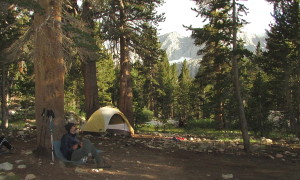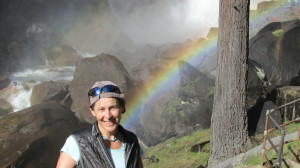Lighten your load for a happier journey through life
Fresno Bee June 26, 2014
I am hiking the John Muir Trail as you read this. My 17-year-old son and I will walk over 200 miles through the Sierra from Yosemite to Mt. Whitney. By the time we are done we will have gained and lost some 45,000 feet of elevation.
The key to a long hike is a strong companion and a light pack. This is the truth of the trail. It is also a metaphor for life. Life is long, so lighten your load and find good hiking partners.
Whatever you carry will be on your back the entire way. A useful motto is “don’t bring it, if you don’t want to carry it.” That motto also holds for our psychological and spiritual loads. Leave regret, anger and resentment behind. Those negative emotions only weigh you down. It is sometimes difficult to move forward. But time marches on with or without us.
Our ancient ancestors were nomads, who followed the seasons and the herds. Our ancestors migrated to the U.S. and to California. The freedom of the wanderer is in our blood. Our forebears must have travelled light to get here.
But we are burdened by the weight of our habits. The older you get, the bigger your pack becomes, and the more difficult it is to move on. The longer you stay in one place, the deeper your habits become, and the harder it is to leave them behind.
There is a kind of elegance in traveling light. Traveling light means freedom. Without piles of stuff to weigh you down, you are always ready to ramble. But traveling light requires preparation. You have to pack carefully, with an eye to the difference between luxury and necessity.
What do you really need to lug with you? How much are you willing to carry? Most of the stuff that fills our houses is not necessary. Consider how much we eat — and throw away — during the course of a day or a week. A light pack contains few luxuries, maybe some chocolate or coffee.
But our culture encourages full pantries and stomachs. Advertising creates a need for more stuff. But if you had to carry that stuff around all day, you’d laugh at those who encourage you to buy more. Our nomadic ancestors would be amused.
I’ll admit that I like stuff, too. Even backpackers enjoy shopping for gear and groceries. But the process of trimming down your load forces you to evaluate priorities. You don’t need much to be healthy and happy.
Religions have long cultivated this sort of abstemiousness. Prayer and meditation turn the mind away from the loaded larders of our desires. The Sabbath is a weekly break from busy consumption. Some religions take a monthly break: Ramadan or Lent, for example. Take some time off. Give something up. Let something go. That’s good advice.
In our secular culture, the wisdom of the Sabbath is forgotten. Nor do we celebrate abstinence. A day without shopping is not good for business. Even our vacations are filled with frantic consumption. Indeed, we work harder during the week to be able to afford our weekend getaways.
There is wisdom in simplified daily living. Work enough to live decently. And use the rest of your time to explore and cultivate relationships with family, friends and the natural world.
A long hike is a kind of spiritual walkabout. You discover something about yourself and world by leaving home with only what you can carry on your back. When it all goes right — no rain, no blisters, etc. — the simplicity of the trail is a joy. You watch your step and walk until you find a good place to sleep. Other concerns slip away.
Hiking is walking meditation. Each step is simple and focused. Each creek crossing is a pleasure. Each summit is a triumph. Each night under the stars is a miracle. And each morning, we’re thankful for the lightness of our packs as we strap them on for another day.
It is invigorating to be part of that bustling wonder called civilization. We’ll be glad to get back to town. But there is also wisdom in the simplicity of the trail and the freedom and grace of traveling light



